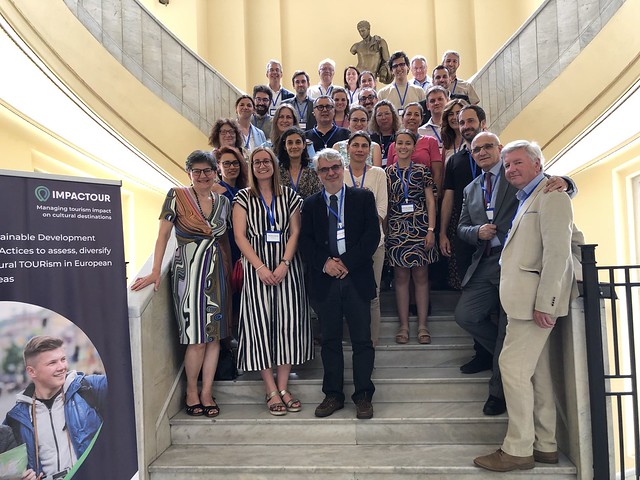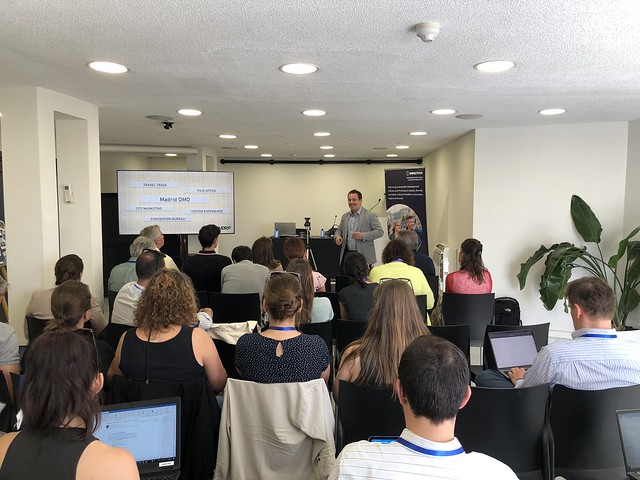IMPACTOUR Project concludes with events in Madrid and Brussels to launch a management support tool for sustainable cultural tourism
In January 2020, 12 partners from across Europe, including Europa Nostra, met in Lisbon to embark upon a project funded by the European Union’s Horizon 2020 Research and Innovation Programme with the ambition to help manage sustainable cultural tourism. Within two months, all assumptions about tourism were challenged by the COVID-19 pandemic. Suddenly, sustainable tourism became ‘0 tourism’. It was the most dramatic demonstration of the relationship between tourism and sustainability. Suddenly, the project gained an imperative to develop a managed response to help reinvigorate an entire European sector suffering unprecedented duress.
Working with specialists in destination management organisations, and scientific and technical partners with expertise in data-based tourism strategic planning, Europa Nostra was able to draw upon the experiences of its member organisations and networks to shape the project’s objectives. The aim was to develop a tool and guidance that would support marginalised and under-resourced destinations, especially rural, to build sustainable growth. But the aim was also to regulate the saturation of some destinations where the intensity of tourism has soured the experience for visitors and host communities.
The project took its cue from the Cultural Heritage Counts for Europe study, led by Europa Nostra, in which true sustainability relies on the successful balance between the domains of cultural, social, environmental and economic factors, all of which suffered during the pandemic. However, the experience of coping with it was turned to good effect by enabling a review of the resilience of infrastructure (travel, online, communication and publicity networks, supply chains) and the relationship between visitors and host communities. All elements are opportunities for informed decision-making in which the pooled experiences of the IMPACTOUR partners could develop and test management models.
The project journey raised the profile of Europa Nostra within the tourism sector and especially cultural tourism, both of which contribute significantly to the European economy and celebration of Europeanness, especially as people emerging from the pandemic regained an appetite for exploring, wellbeing and cultural stimulus.
By the spring of 2023, the project outcomes were ready to share with a wider audience. On 20-21 June, at the Circulo de Bellas Artes in Madrid, Spain, the project partners and ‘data pilots’, which had contributed to and tested the management tool, gathered to publicise and demonstrate the benefits. The event was hosted by Joaquín García of Cultur and Santa Maria la Real Foundation, and opened with a keynote address by Sneška Quaedvlieg-Mihailović, Secretary General of Europa Nostra, who placed the project in the wider context of a Europe redefining its place in the world, being more mindful of SDGs and societal impacts that are at the heart of action of a responsible civil society.
Today & tomorrow in #Madrid, our Secretary General @SneskaEN participates in the #IMPACTOUR closing conference, which will reveal the main outcomes of the project, incl. a new tool for sustainable #CulturalTourism. 🌍🏛️🏞️ Europa Nostra is a partner of this 🇪🇺 #Horizon2020 project https://t.co/N1nIBa8IKf
— Europa Nostra (@europanostra) June 20, 2023
The conclusion of the IMPACTOUR project coincides with the launch of the European Heritage Hub led by Europa Nostra, in which Sneška Quaedvlieg-Mihailović stressed the importance of decentralising and equally working in all parts and regions of Europe: “Europe does not live only in Brussels. Europe lives in every city, every town, every village”. The creation of Europa Nostra’s own hubs around Europe provides opportunities to focus energies, such as for Venice, the cause célèbre of tourism tension between joy and stress, quantity and quality, capacity and sustainability, visitors and resident communities. These are where Europa Nostra is a stakeholder in frontline cultural tourism.
Participants split into groups to discuss four principal areas of sustainable cultural tourism – urban, rural, natural, and itineraries –, after which Prof. João Martins, of UNINOVA Lisbon and the IMPACTOUR Project Coordinator, presented the current state of the art for this tool that would be presented to the European Commission the following week in Brussels. The example of Transromanica illustrated the importance of data collection and how, once the data has been introduced, the tool can analyse it and suggest a diverse set of actions for each specific site. The target public of this tool is site managers, and public and private entities in charge of day-to-day governance.
Guest speakers included Iván González, Director of Madrid Destino, who described how the Spanish capital manages cultural tourism and its sustainable development of 9 million visitors a year, and Manos Vougioukas, Secretary General of the European Cultural Tourism Network (ECTN), whose presentation emphasised the value of stakeholders and their collaborations. The event provided an opportunity for celebrating the common aims and strong relationship of Europa Nostra with Hispania Nostra, our country representation in Spain.
On 27-28 June in Brussels, the partners of IMPACTOUR joined with representatives of five other Horizon 2020 projects that also had been developing cultural tourism resources at the International Conference on Cultural Tourism Advances. Hosted by Bart Neus at KU Leuven University, the SmartCulTour project coordinator, the event showcased the collective contributions of the projects, including of IMPACTOUR by Europa Nostra project representative and Board member, Graham Bell, who highlighted the project’s role in delivering against Europa Nostra’s Strategic Plan: Horizon 2025, and the Horizon Europe Strategic Plan 2025-2027 Analysis, in which the role of civil society is critical to tourism and sustainability.
The main outcomes of #IMPACTOUR were presented this week at the International Conference on #CulturalTourism Advances, Brussels. As a partner of this 🇪🇺#Horizon2020 project, we look forward to sharing more on the new sustainable #CulturalTourism IMPACTOUR tool 🔜 @gb_culturatrust https://t.co/MlBMu1aMeV
— Europa Nostra (@europanostra) June 29, 2023
On this occasion, our Secretary General also visited the headquarters of Hispania Nostra and held talks with its President, Araceli Pereda Alonso, ahead of the Spanish Presidency of the Council of the European Union.
Today in #Madrid: Great joy to visit the office of @HispaniaNostra – a partner of our @EurHeritageHub & to learn more about their numerous activities led by its President, #AraceliPereda & her Dream Team.
Also delighted to visit the #Sorolla exhibition at the Royal Palace! pic.twitter.com/xCCctko3N4— Sneška Quaedvlieg-Mihailović (@SneskaEN) June 19, 2023









